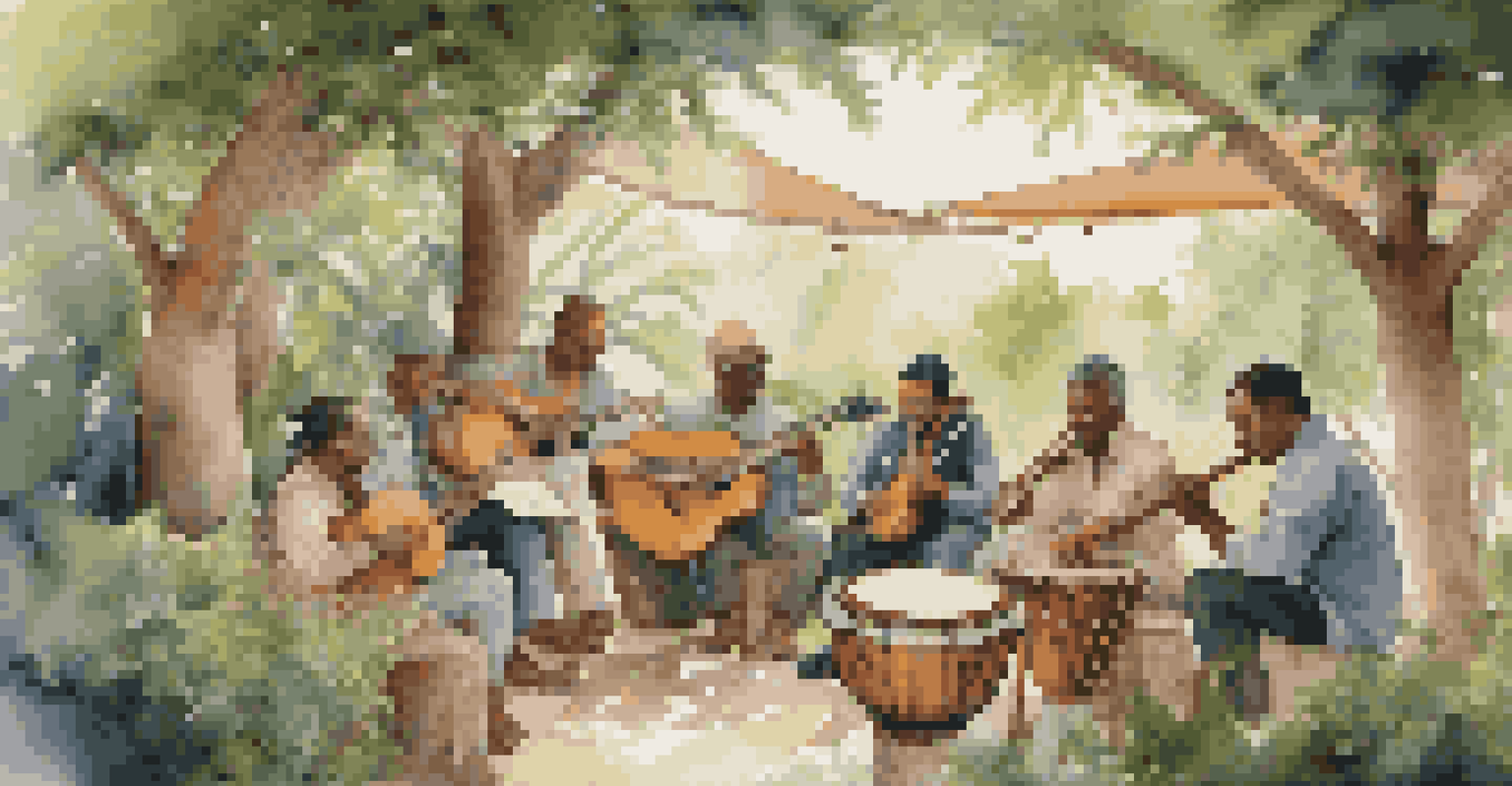Music as an Expression of Cultural Identity and Exchange

Understanding Cultural Identity Through Music
Cultural identity is like a tapestry, woven from various threads of traditions, languages, and experiences. Music plays a vital role in this tapestry, often serving as a mirror reflecting the values and beliefs of a community. For instance, traditional folk songs can encapsulate the history of a region, offering insights into the lives of its people. By listening to these songs, one can gain a deeper appreciation for the culture they represent.
Music is the universal language of mankind.
Moreover, music often acts as a vehicle for storytelling, conveying narratives that define a culture's identity. It's not just about the rhythm or melody; it's about the stories behind the songs that resonate deeply with listeners. For example, the blues genre emerged from African American communities, expressing struggles and triumphs in a poignant way. This connection between music and cultural expression is what makes it so powerful.
In essence, music serves as a cultural artifact, preserving the essence of a community for future generations. It helps individuals connect with their roots while also inviting others to learn and appreciate different cultural perspectives. This exchange creates a rich dialogue, fostering understanding and respect among diverse groups.
The Role of Music in Cultural Exchange
Cultural exchange is the process of sharing ideas, values, and traditions between different cultures, and music is one of its most dynamic forms. Through music, people can experience a culture without ever having to leave their own hometown. For instance, festivals often feature international artists, allowing attendees to immerse themselves in various musical styles while celebrating diversity.

Moreover, social media has transformed how music is shared globally, breaking down geographical barriers. Platforms like YouTube and Spotify enable artists from different backgrounds to collaborate and share their music with a wider audience. This cross-pollination of musical styles can lead to the creation of new genres, blending elements from different cultures into something fresh and innovative.
Music Reflects Cultural Identity
Music serves as a mirror of cultural values and beliefs, preserving the essence of communities and allowing individuals to connect with their roots.
Ultimately, music serves as a universal language that transcends boundaries, fostering connections among people from all walks of life. By participating in cultural exchange through music, individuals can discover new perspectives and experiences, enriching their understanding of the world around them.
Music as a Tool for Social Change
Throughout history, music has been a powerful catalyst for social change, inspiring movements and uniting people around common causes. From protest songs of the 1960s civil rights movement to contemporary anthems advocating for climate action, music has the ability to mobilize communities. For instance, Bob Dylan's 'The Times They Are A-Changin'' became an anthem for change, resonating with those fighting for equality.
Without music, life would be a mistake.
This impact of music is often felt in the emotional connection it fosters. Lyrics can articulate feelings of injustice and hope, encouraging listeners to take action. Songs like 'Fight the Power' by Public Enemy encapsulate the struggles faced by marginalized communities, serving as a rallying cry for change and empowerment.
Moreover, music has the ability to bridge gaps between generations, inspiring young people to engage with social issues. By tapping into the collective consciousness, artists can raise awareness and inspire dialogue around pressing social matters, showcasing the profound role music plays in shaping societal norms.
Globalization and Its Impact on Music
Globalization has transformed the way we consume and experience music, making it more accessible than ever before. With just a click, listeners can explore diverse genres from around the world, broadening their musical horizons. This accessibility allows for a richer appreciation of different cultures and their unique sounds, fostering a greater sense of unity.
However, globalization also raises concerns about cultural homogenization, where dominant musical trends can overshadow traditional forms. For example, the rise of pop music has led to the decline of local music scenes in some regions, as artists struggle to compete with mainstream hits. This can result in a loss of cultural heritage and identity, making it crucial to strike a balance between global and local influences.
Globalization Enhances Musical Diversity
While globalization makes diverse music accessible, it also poses challenges like cultural homogenization, highlighting the need to balance global influences with local traditions.
Despite these challenges, globalization can enrich musical diversity, creating hybrid genres that blend various cultural elements. This fusion often results in innovative sounds that reflect the interconnectedness of our world, showcasing how music can evolve while still honoring its roots.
The Influence of Technology on Music and Culture
Technology has revolutionized the music industry, changing how artists create, share, and promote their work. Digital tools allow for unprecedented creativity, enabling musicians to experiment with sounds and collaborate across distances. For instance, artists can now record and produce music from home studios, making it more accessible for aspiring talent to enter the industry.
Moreover, streaming services have transformed how we consume music, allowing listeners to explore a vast library of genres and styles at their fingertips. This shift has democratized music access, enabling people from different backgrounds to discover and appreciate diverse cultural expressions. Playlists curated by algorithms can introduce listeners to music they might never have encountered otherwise.
However, the ease of access also poses challenges for artists trying to stand out in a saturated market. As new music floods the digital landscape, it becomes increasingly important for musicians to find innovative ways to connect with their audience. Ultimately, technology serves as both a tool for creativity and a challenge for cultural expression in the music industry.
Music Festivals: Celebrating Cultural Diversity
Music festivals have become a vibrant hub for cultural exchange, bringing together artists and audiences from around the world. These events offer a unique opportunity to experience a variety of musical styles and traditions in one place. For instance, festivals like Coachella or Glastonbury showcase a diverse lineup, reflecting the rich tapestry of global music.
Furthermore, festivals often emphasize inclusivity, encouraging collaboration between artists from different backgrounds. This blending of styles can lead to unexpected and beautiful musical experiences that celebrate cultural diversity. For example, collaborations between hip-hop artists and traditional musicians can create innovative sounds that resonate with wider audiences.
Technology Transforms Music Creation
Advancements in technology empower artists to create and share music more easily, but also present challenges in standing out within a saturated digital market.
In addition to showcasing music, festivals often provide a platform for cultural education, featuring workshops and discussions that highlight the significance of different musical traditions. This emphasis on learning fosters a greater appreciation for the cultures represented, allowing attendees to engage with the music on a deeper level.
Conclusion: The Future of Music and Cultural Identity
As we look to the future, the role of music in expressing cultural identity and facilitating exchange remains as vital as ever. With ongoing advancements in technology and globalization, the landscape of music will continue to evolve, presenting new opportunities for artists and audiences alike. Embracing this change while honoring cultural roots will be essential for preserving the rich diversity of musical traditions.
Moreover, as social issues continue to emerge, music will likely remain a powerful tool for advocacy and change. Artists will continue to use their platforms to address pressing concerns, inspiring future generations to engage in social justice through their art. The ability of music to resonate across cultural boundaries will play a crucial role in fostering understanding and connection.

Ultimately, music is not just a form of entertainment; it is a vital expression of our shared humanity. By valuing and celebrating the diverse sounds and stories that music brings, we can cultivate a more inclusive world that honors the cultural identities that enrich our lives.